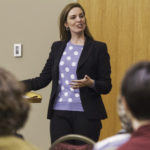Editor’s Note: This article first appeared on Ethics Daily on September 5, 2018.
Where are the women?
I was left pondering this question after attending the Texas Baptist Family Gathering in Arlington a few weeks ago.
The Family Gathering was a wonderful weekend of worship, fellowship and learning about issues facing the church today.
On the first night of the convention, church leaders and members from all over the state gathered for a special Lord’s Supper service. The leaders of the convention did a wonderful job of intentionally incorporating members from diverse backgrounds.
Representatives from the African-American, Vietnamese, Hispanic, Chinese, Bivocational/Small Church and Western Heritage fellowships worked together to explain the significance of the Lord’s Supper, read Scripture and distribute the elements. It was a beautiful picture of the unity Christ calls the church to pursue.
As a university student interested in missions and racial reconciliation, this concerted effort warmed my heart. The ceremony seemed to me to be a glimpse of heaven. Instead of the divisions that so often characterize our time, I saw true unity expressed.
And yet.
A picture of unity with something missing
While I felt such joy to see the Baptist General Convention of Texas breaking down racial barriers, I could not help but ask myself, “Where are the women?”
Sign up for our weekly edition and get all our headlines in your inbox on Thursdays
Of the six people asked to lead the communion service, all were men.
I understand the men asked to lead were all leaders of their respective fellowships, associations and conventions. Yet no one from Texas Baptist Women in Ministry was asked to lead.
While the BGCT included members of as many ethnicities as possible, it seems they neglected an entire half of their members.
I doubt this oversight was made with any ill intent. However, I think neglecting to include women in serving the Lord’s Supper points to a greater problem within the BGCT and within the Baptist community as a whole.
When women aren’t at the table
When the leaders of the BGCT asked representatives of ethnically diverse groups to lead the Lord’s Supper service, they did not just recognize their attendance at the convention; they validated and affirmed their calling.
They showed the next generation of ministers that to lead in Baptist churches, they do not have to be white. Those who served the Lord’s Supper were a physical representation of African-American, Hispanic, Vietnamese and Chinese pastors—evidence God’s call of ethnic minorities is possible.
So many young women who feel called to the ministry may rarely or never see such representation. They may never have heard a woman preach or seen a woman in a position of church leadership.
Just as in the past women thought it impossible to be doctors, lawyers or CEOs, many women today still think being a pastor in a Baptist church is impossible.
Affirming God’s call of women must be public
If we are to encourage both current and future women in ministry, we must affirm them out loud and in public.
The Lord’s Supper service at Texas Baptists’ gathering sent a statement: “We are a unified, loving body of believers who value people of every culture and origin.” The lack of women among the worship leaders sent a quieter, underlying message: “But we’re not sure about women just yet.”
I would encourage Baptist leaders—from the state level to the local level—intentionally to select women for positions of leadership.
Ways to publicly affirm God’s calling of women
Each convention and congregation is different. For some, selecting a woman for leadership may mean hiring a female pastor. For others, it may mean asking a woman to stand behind the pulpit and read Scripture or sending her as a messenger to vote at convention meetings.
Participating in the annual Martha Stearns Marshall Month of Preaching, organized by Baptist Women in Ministry, is another avenue to encourage female ministers and model for younger generations that women are called to serve as preachers and pastors.
Whatever it is, let us show young women that while Christ has called men to lead, he has also called women.
I would also encourage the church to highlight women in Scripture, whose stories are often overlooked or saved for occasions like Mother’s Day.
Let us remind our young women and men of the heroic acts of Deborah, Jael and Esther. Let us admire the loyalty of Ruth and the persistent prayer of Hannah. Let us learn to sit at the feet of Jesus like Mary and follow him like Junia. Let us learn to serve like Phoebe and work hard like Lydia.
Who knows what else God may teach us through women in ministry today? The only way to know is to give them a seat at the table and a place on the stage.
Grace Mitchell is a senior at Hardin-Simmons University. She works as a staff writer for the HSU Marketing Department and as a social media manager for Logsdon Seminary. You can find her on Facebook and LinkedIn.














We seek to connect God’s story and God’s people around the world. To learn more about God’s story, click here.
Send comments and feedback to Eric Black, our editor. For comments to be published, please specify “letter to the editor.” Maximum length for publication is 300 words.